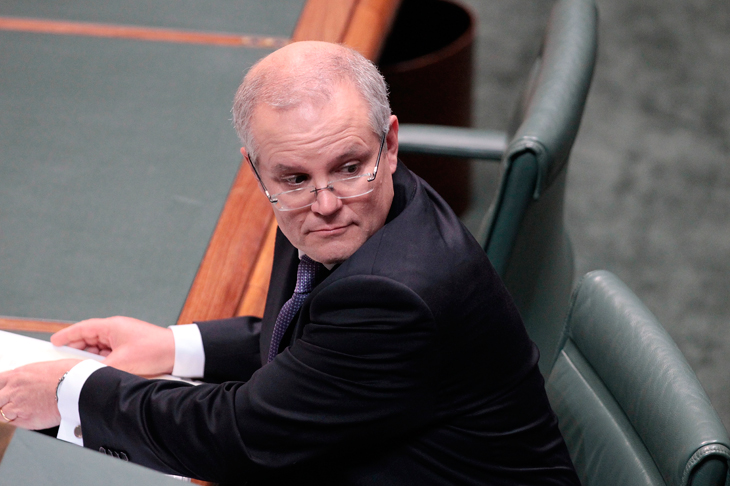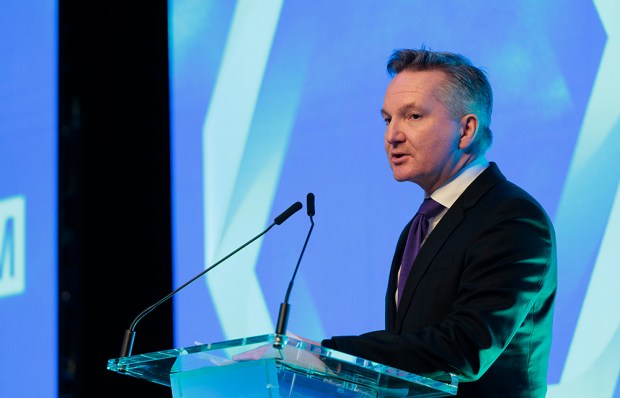Equality of opportunity, not of outcomes; it’s the classic free enterprise backbone of Liberal philosophy. So attacking Bill Shorten’s politics-of-envy declaration that ‘Tackling rising inequality will be a defining mission’ for a future Labor government should have been straightforward. Instead, Scott Morrison relied on a contestable survey that showed no evidence of rising inequality this century to claim that ‘income inequality has actually got better’. That was instead of simply defending the principle of inequality of reward for unequal contributions to the growth of the nation’s wealth. As a Treasury study recently noted, ‘Rising income inequality cannot be labelled good or bad; an upward trend in income inequality since the mid-1990s has coincided with sustained economic growth’. And the OECD reported that while the latest decade brought a 40 per cent rise in income for the top 20 per cent of households, the bottom 20 per cent also benefited at 25 per cent, as economic growth pulled wage-earning households further ahead of those reliant on government support.
Morrison’s wrong choice of weapon was underlined when Reserve Bank governor Philip Lowe received extensive media cover for speedily disagreeing with him, telling a seminar that income inequality has ‘drifted up a little bit, but not very much’ while wealth inequality had become more pronounced due to big gains in prices of assets held by ‘wealthy people’. What Lowe failed to mention was that an RBA study rejected both income and wealth as measures of inequality. It found that ‘Consumption is a more appropriate measure of household well-being’ as ‘income will overstate the level of inequality’. It concluded that consumption inequality is lower, having risen by less since the 1990s. But as the study excludes ‘consumption of government goods, social transfers in kind, such as government-funded goods and services like education and health care… it tends to overstate the level of economic inequality’. Low-income households also benefit from jobs growth and low levels of unemployment through reducing the proportion of jobless households.
So the Morrison-Lowe disagreement provides, in reality, far less respectability to Shorten’s tax-the rich anti-inequality campaign, particularly as Lowe’s call for increased wages to kick the economy along implies further rises in inequality between wage-earning households and government beneficiaries. And the OECD is no fan of the Shorten plan: ‘Simply shifting large amounts of money from high income earners to low income earners through the tax and transfer system is neither an effective nor sustainable way in which to lower income inequality’.
But expect to be inundated with anti-inequality political propaganda from Labor’s widespread allies. ‘Income inequality is worsening in Australia as renters, pensioners and students are feeling the pinch while high earners get pay rises’, was the recent news from the union-controlled ME Bank, despite its financial comfort index actually improving. It is going to be a tough battle. Four years ago, Christine Lagarde accurately linked rising inequality with rising populism, while this year the IMF laments that ‘amid weak growth and rising inequality, popular support for international trade and immigration has eroded’. Dick Smith is betting $1 million on this horse. His campaign to cut immigration could have inequality consequences; while 84 per cent of skilled migrants were in employment five years after arrival, less than one third of our humanitarian intake had jobs. And a University of SA study shows that Australian Muslims have an unemployment rate double the average, despite their much lower labour force participation rate. In Britain, a study has provided the classic example of how bias influences news reporting. To one London broadsheet, the news was that ‘Bangladeshi and Pakistani households have experienced the fastest income growth of any group in the UK this century after an improvement in their pay and employment rates’. But to a newspaper with a different political slant, the news lead was ‘Huge gaps in living standards still exist between households of different ethnicities in Britain, with Bangladeshi and Pakistani incomes more than a third lower than white British households’. Don’t expect an honest political debate about inequality.
Got something to add? Join the discussion and comment below.
Get 10 issues for just $10
Subscribe to The Spectator Australia today for the next 10 magazine issues, plus full online access, for just $10.
You might disagree with half of it, but you’ll enjoy reading all of it. Try your first month for free, then just $2 a week for the remainder of your first year.














Comments
Don't miss out
Join the conversation with other Spectator Australia readers. Subscribe to leave a comment.
SUBSCRIBEAlready a subscriber? Log in